Get in Touch
Email Address
Info@rhino.com
Phone Number
Sales: +098 765 4321
The belief of having two ghosts, one for the Ah Ye and the other for the Ah Pe clan means each family can only consult with the ghost doctor of their lineage, unless there is an emergency or he is absent from the tribe. This is because the two ghostly clans, each abides by different traditions and rituals. They all follow a “weekly” cycle that lasts for ten days. In the week there is one rest day which pertaining to a ghost. There are multiple families within a ghost clan and each is assigned to his own holidays. This day of rest changes and depends on the deceased family member. If someone within the family is deceased the day of rest will change depending on the day of death. The Luwa do not have communal holidays, such as Saturdays or Sundays. This may be due to their societal and cultural foundations: farming. Rice fields need constant care, with the non-communal holidays, the village ensures there is always someone tending to the crops and thus ensuring that there is food for the day. This culture of holidays stems from a deeper meaning: survival. In this aspect the Luwa society is a pure farming society, not an industrial one like the world beyond their hilltops.
The Luwa are a farming society, seeming to be Thais sixty years ago. Their agricultural society implies their religion, culture, and the way they live their daily lives. In this aspect, ghost doctors are needed to lead and uphold these traditions. Without their influence the village would be without food and water. These traditions are kept not only to satisfy religious needs, but they also exist to keep the village alive.

Small animals are raised for special feast

The hill behind is where farming takes place
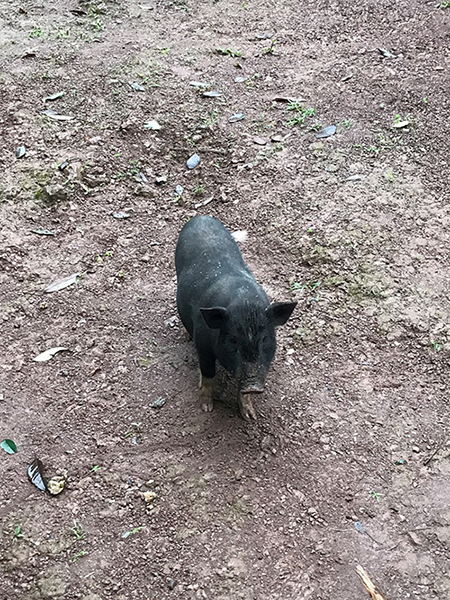
This pig might be used to barter for other necessities such as clothing
However, one battle that has already been lost is the Thai government infiltration into the Luwa community. Because the Luwa-Prai exist on Thai territory, which was previously unclaimed, they are subjected to the Thai education system. Because they are taught the Thai language, Thai traditions, and Thai history, the Luwa children, their families, and society have changed and are changing. Traditions that once were the basis of their culture are fading.

A boy and his sister dressed up for school

The children are walking to school taught by Thai teacher

Thai flag in front of the school where children are taught to sing Thai anthem
Rice is the center of the Luwa civilization, however the rice-pounder that once lay beneath every house is no longer found. Very few households still partake in rice pounding, now they rely on the rice mill. Instead of steaming their own rice, they used electricity powered rice cookers. Although this may seem like beneficial development, it is a step into the complete destruction of the Luwa culture. Like the non-communal holiday system, house architecture, barter system within the village, ghostly families, ghost calendar, ten-day week structure, marital process, matriarchy, reverence in the ghost doctor, and down to the nature of the Luwa-people. Once the rice pounding tradition is fully replaced with rice mills, and in-home rice steaming is replaced with rice cookers, every aspect of the Luwa community will change for the worse. The village, up in the clouds, will lose everything that made it unique, it will lose everything that made it Luwa-Prai.
The Luwa are not like other tribes, they are not proud in their culture. This makes them susceptible to outside influence and the complete culture takeover. Nowadays, some Luwa-houses have solar panels, a gift from missionaries to those who converted to Christianity, to power television sets, rice cookers, radios, and phones.
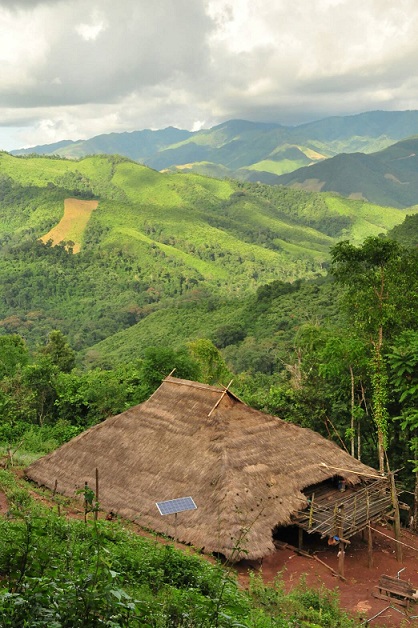
A solar panel, a gift from the missionaries to those who converted to Christianity.

All the children gathered to watch Thai series in front of the only television in this village
Their houses are also changing. The traditional Luwa house is a hut raised four feet off the ground to prevent damage when flooding occurs. It is built out of wood that they harvested from their own-grown trees. The roofs are made of layered hay, making it waterproof and slip-proof. The ladder allows visitors to enter the living room, which has a coal oven that serves to heat the house, cook food, and offer light. Because of hay ceiling the charcoal smoke is filtered, leaving clean air. The living room is next to a veranda that lets in light and for washing clothing. There is a door next to the living room that leads to the bedroom of the family members, this room is not open to anyone other than the family members and the ghost doctor: visitors are not allowed beyond the living room. All of this is done in a small house. However this is changing. Some villagers have swapped the rough wood for city-bought polished wood and metal sheets. Some have built cement houses on flat lands, abandoning their ancestor’s way of living. What was once a visage of untouched beauty is now dotted with steel traps and smooth panels. A house is symbolic of the people who live in it, and with the ongoing changes to the Luwa homes, it is clear that outside influence has taken over.
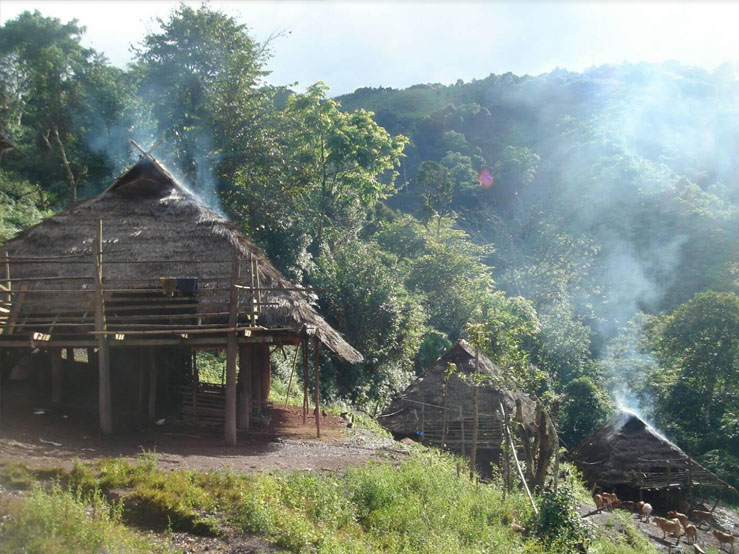
A traditional Luwa house is built of wood and plants from the jungle
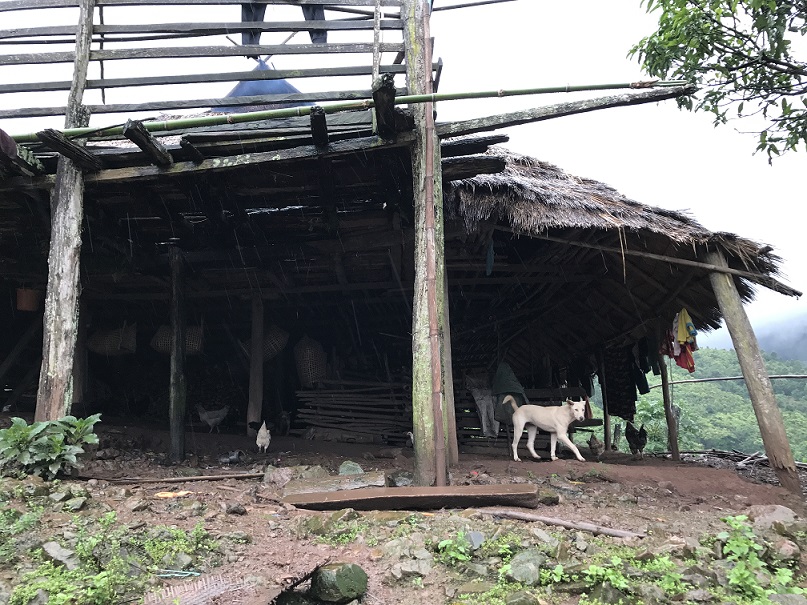
The huts are raised off the ground to allow storage and livestock shelter, as well as to protect the inhabitants from flooding.
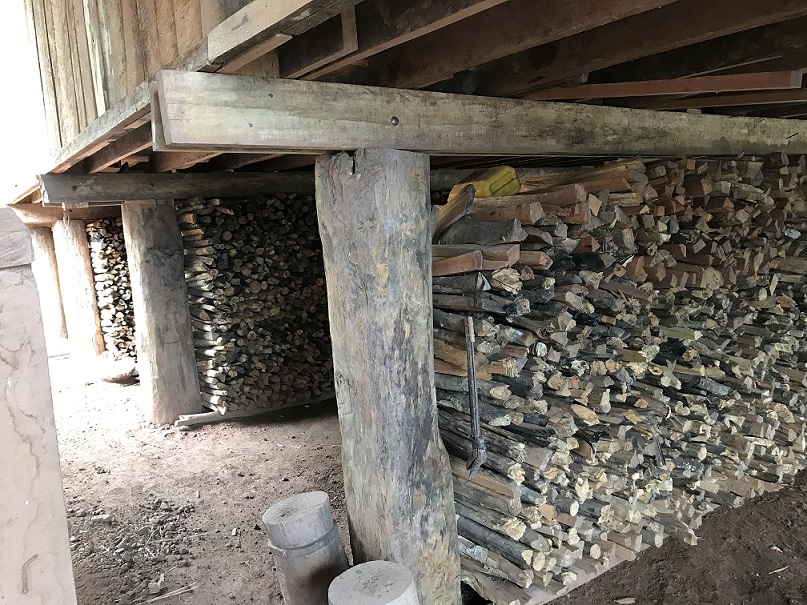
The wood-burning culture of the Luwa requires a large supply of firewood, which is stored beneath their homes.

Here, the intricate pattern of leaf thatching can be seen, making it waterproof and able to shed rain easily.
Luwa-style architecture is not the only aspect that has changed. Another foundational shift has already occurred. Because the Luwa language is an oral language, there is neither a written form nor any inscription that children can study from. Due to this the language itself is slowly disappearing and being replaced with Thai. Words such as television or Pepsi are not words that existed in their language, which resulted them in using Thai. This signifies, not only a linguistic change, but also a cultural change as well. Luwa are beginning to adopt, into their lives, technology and objects that have never been used in their society before, thus resulting in a change in lifestyle.
Another major shift in language is in the names of the Luwa children. Names used to hold religious, familial, and natural significance, however that is changing. Some children are named after Thai celebrities: Pancake, DJ, and more. These names do not reflect Luwa society or their deep culture; instead they are empty nicknames that celebrities have adopted. In addition, the Luwa names are changing on a lawful level. Traditionally, Luwa surnames are titled after the ghosts of Ah Pe and Ah Ye. However this was not understood or accepted by the Thai government, thus grouping the whole village under that surname of “Jai Ping”. Everyone in the village, regardless of heritage or family line, is called “Jai Ping”. This includes the Luwa-Prai’s distant relative called the Luwa-Man, who resides in a different location and has its own culture, is called “Jai Ping”. However, the last name of “Jai Ping” has no significance in Thai. “Jai” in Thai means heart, but the word “Ping” has no meaning. It is a word that the Thai officials attached to the word “Jai” for its easily remembered ring. To gift two whole villages a last name is to give them identity and a standing in Thai culture. However the name Jai Ping means nothing. To name two groups of people ‘nothing’, is to acknowledge them, their culture, and their village as nothing. This is a direct insult to them and their way of life.
Modernization is inevitable. The question is how it will be done and at what pace. One can only hope that Mor Reed will be able to instill some of Luwa’s tradition in the future generation. For children to grow up without knowing their roots and tradition is the beginning of a fading culture, a decaying society.